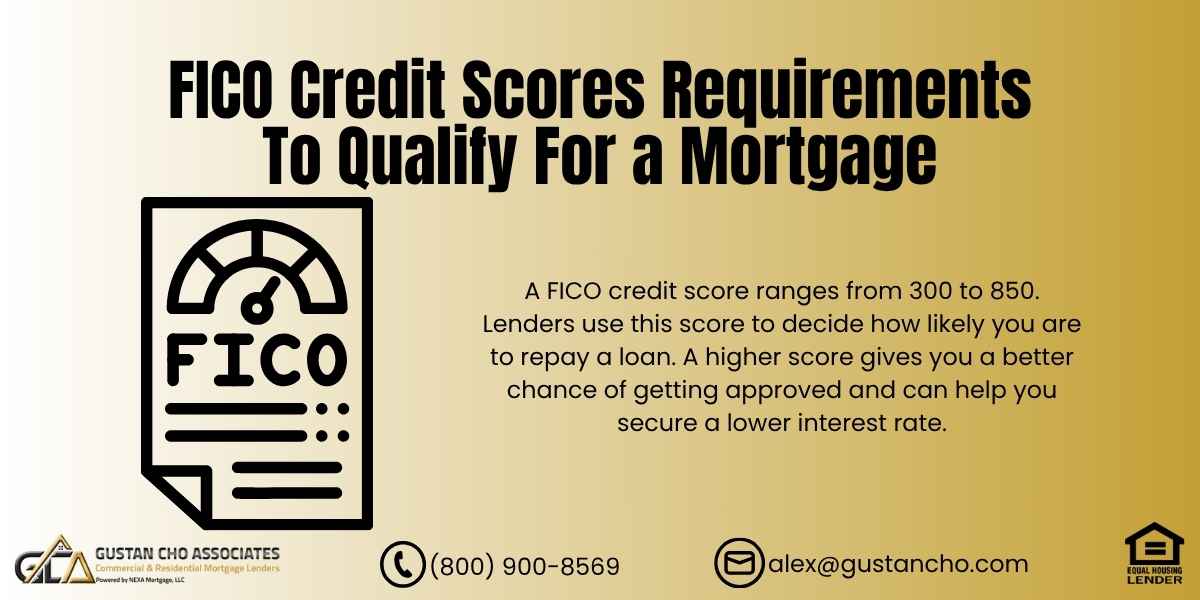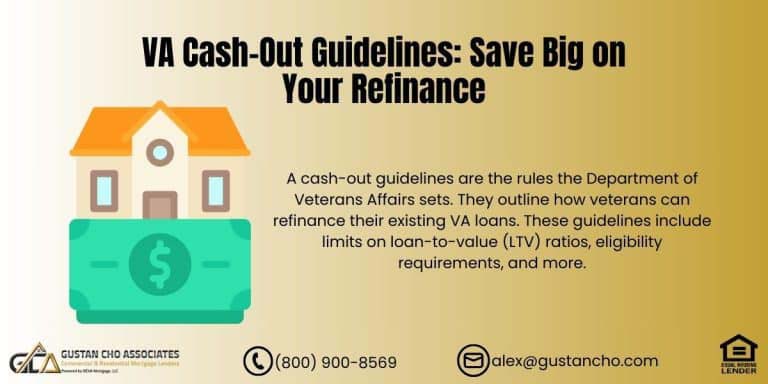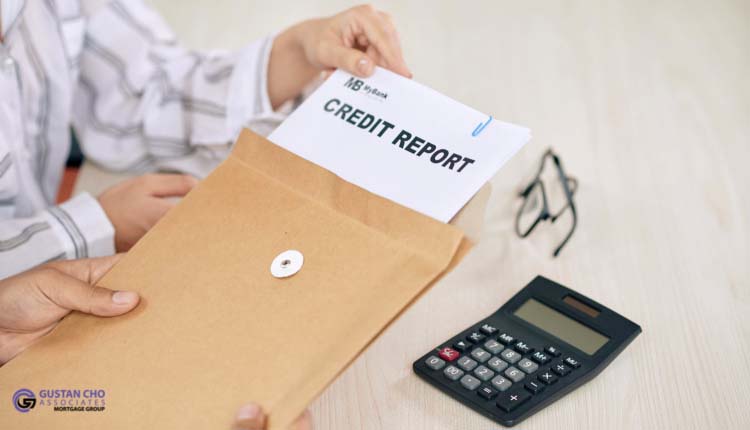FICO Credit Score: Mortgage Requirements and How to Qualify in 2025
Your FICO credit score plays a significant role in how easily you can buy a home, how much money you can borrow, and the interest rate you’ll get stuck with. If you want a mortgage, lenders will check your FICO credit score to decide if you’re a good risk.
This guide will walk you through your FICO score, why it matters, what score you need for different types of home loans, and how to improve your score to get better loan terms.
At Gustan Cho Associates, we help borrowers with low credit scores, no credit scores, or past credit problems get approved for a mortgage. We don’t have lender overlays, which means we follow standard agency guidelines without extra rules. Even if you’ve been denied elsewhere, we may be able to help.
What Is a FICO Credit Score?
A FICO credit score is a way to show how trustworthy you are when borrowing money, ranging from 300 to 850. Basically, the higher your score, the less of a risk you are to lenders. This scoring system was created by the Fair Isaac Corporation and is widely used by banks and other financial institutions to determine how reliable an individual is with credit.
Lenders look at your FICO score to make important decisions about your mortgage application. This means it helps them decide if you can get a mortgage, what interest rate you might have, and whether you’ll need mortgage insurance. Knowing your FICO score is super important to navigate the borrowing process and get better loan terms.
Here’s a quick FICO score breakdown:
- 800+ = Excellent
- 740–799 = Very Good
- 670–739 = Good
- 580–669 = Fair
- Below 580 = Poor
Not Sure If Your Credit Score Qualifies? Let’s Check
Find out what FICO score you need for FHA, VA, or Conventional loans.
How Is Your FICO Score Calculated?
Your FICO score comes from five key factors:
- Payment history (35%) – Do you make sure to pay your bills on time?
- Amounts owed (30%) – What percentage of your credit limit are you utilizing?
- Length of credit history (15%) – How long have your accounts been active?
- New credit (10%) – Have you opened new credit accounts recently?
- Credit mix (10%) – Do you possess different types of credit, like credit cards or car loans?
If you want to raise your FICO credit score quickly, just keep your balances low and pay your bills on time.
What FICO Score is Required to Get Approved for a Mortgage in 2025?
Every loan type has different FICO score guidelines. Here’s what most lenders require:
FHA Loans
FHA loans need a minimum FICO credit score of 580, which means you can put down just 3.5%. However, if you can put down 10%, the minimum score drops to 500. Additionally, manual underwriting is an option for those with lower credit scores, providing more flexibility in securing a loan.
VA Loans
VA loans do not have an official minimum credit score requirement set by the VA. However, most lenders typically look for a minimum score of at least 580. Gustan Cho Associates, on the other hand, is more flexible and may approve applicants with lower scores if they can demonstrate strong compensating factors.
USDA Loans
To get a USDA loan, you need a minimum FICO credit score of 640 for automatic approval. If your score is below 640, you can still apply through manual underwriting options.
Conventional Loans
Conventional loans require a minimum credit score of 620, adhering to the standards set by Fannie Mae and Freddie Mac. These guidelines help ensure borrowers meet the necessary criteria for obtaining a conventional loan.
Jumbo Loans
Jumbo loans usually need at least a 700 credit score, but some programs might be flexible. They might let you slide by with a lower score if you’ve got a good amount of assets and a solid income.
Refinance Loans
Refinance loans follow the same credit score rules as loans for buying a home. However, one cool exception is the FHA Streamline Refinance, which might not even need a credit score. This makes it an excellent choice for homeowners wanting to refinance their mortgages.
First-Time Homebuyers
FHA loans are an excellent option for first-time homebuyers, especially those with lower credit scores. These loans often come with the added benefit of down payment assistance, which may be available depending on the buyer’s credit score. This support can make the path to homeownership more accessible for those just starting out.
Know Your FICO Score? See What Loans You Qualify For
We break down the credit score requirements for every loan type.
FICO Score and Down Payment Relationship
Your FICO score can affect how much you’ll need to put down. For instance:
- With a 580 score, FHA lets you put just 3.5% down
- With a 500-579 score, you’ll need 10% down
- Conventional loans may require higher down payments if your score is below 700
We work with buyers to find the best loan with the least money down, even if their scores are low.
FICO Score vs VantageScore: Which One Do Lenders Use?
Many people check their credit scores using free apps, but these apps often show VantageScore, not the FICO credit score. Mortgage lenders do not use VantageScore. They pull FICO scores from all three credit bureaus and use the middle score to qualify you.
So if one bureau says 580, another says 620, and the third says 640, your qualifying score is 620.
How Do Lenders Verify FICO Scores?
Lenders usually check your FICO score by getting a tri-merge credit report. This report includes scores from the three main credit bureaus: Equifax, Experian, and TransUnion. It shows important information like your payment history, how much debt you owe, and any collections, charge-offs, or late payments. Lenders look at your middle FICO score from this report to decide if you qualify for a loan.
How FICO Scores Affect Your Mortgage Interest Rate
The better your FICO score, the lower your interest rate. Here’s an example:
- 760+ score: Rate around 6.25%
- 620 score: Rate closer to 7.75%
After 30 years, that little difference can pile up to tens of thousands in interest. That’s why improving your credit score before getting a mortgage can help you save money.
How to Improve Your FICO Credit Score for Mortgage Approval
Here are tips to raise your score fast:
- Make sure to pay all your bills on time.
- Maintain credit card balances under 30% of the overall credit limit.
- Avoid opening new credit cards or loans
- Don’t close old credit accounts
- Check your credit report for errors
- Don’t dispute accounts during the mortgage process
We also offer rapid rescore services to help raise your FICO score quickly if you’re on a tight timeline.
Best Mortgage Lenders for Low FICO Scores
Many banks turn away borrowers with low credit scores, even when they meet FHA or VA guidelines. At Gustan Cho Associates, we specialize in helping:
- Borrowers with scores as low as 500
- Clients with recent late payments or collections
- Self-employed buyers with complex finances
We work with over 210 lenders and offer loans with no lender overlays. That means we approve loans that banks deny.
Exceptions for FICO Score Underwriting
You may still qualify through manual underwriting if your credit score is too low for automated approval. This is available for:
- FHA loans
- VA loans
- USDA loans
Manual underwriting considers other factors, such as rent history, job stability, and low debt-to-income ratios, to approve a loan.
Conforming Loan FICO Score Limits
Conforming loans adhere to the limits established by Fannie Mae and Freddie Mac. For 2025, the typical FICO credit score limits are as follows: a minimum score of 620 is generally required for single-family homes. However, many lenders often expect a higher FICO score of 660 or more for properties with two to four units. While some lenders may impose even stricter requirements, the information provided here does not include any additional overlays.
What Happens If Your FICO Score Drops During the Mortgage Process?
Your credit score may be pulled again right before closing. If your score drops:
- You could get a worse rate
- You might need more reserves
- In some cases, you could lose your approval
To prevent this:
- Don’t open or close credit accounts
- Don’t make late payments
- Don’t max out credit cards
- Avoid disputing items on your credit report
Let your loan officer know about any big financial changes right away.
Improve Your Credit, Unlock Better Loan Options
Let’s create a game plan to boost your score and buy your dream home.
Average FICO Credit Score for Mortgage Approval in 2025
The average FICO score for approved homebuyers in 2025 is around 715. But many buyers qualify with scores far below that, especially for government loans.
At Gustan Cho Associates, we regularly help buyers get approved with scores in the 500s and 600s.
Final Thoughts: Take Control of Your FICO Credit Score
Your FICO credit score is the key to homeownership. It affects your ability to qualify, your rate, your monthly payment, and your total loan cost. The good news? You have control over it.
Whether you’re at 500 or 800, Gustan Cho Associates will help you find the best loan option and get approved. Even if you’ve been denied by a bank, we can help you get back on track.
Ready to See What You Qualify For?
Apply online in minutes or give us a call today. We’ll review your credit, go over loan options, and help you get pre-approved fast—even with low FICO scores.
📞 Call us at 800-900-8569 📧 Email us at alex@gustancho.com 🌐 Visit us at www.gustancho.com
Don’t let your credit score stop you from becoming a homeowner. Let’s make it happen together.
Frequently Asked Questions About FICO Credit Scores:
Q: What is a FICO Credit Score?
A: A FICO credit score ranges from 300 to 850. Lenders use this score to decide how likely you are to repay a loan. A higher score gives you a better chance of getting approved and can help you secure a lower interest rate.
Q: What’s a Good FICO Credit Score to Buy a Home?
A: A score of 720 or higher is good for loans. However, you can still qualify with a lower score. For FHA loans, the minimum score is 580. If you can make a larger down payment, you may qualify with a score as low as 500. At Gustan Cho Associates, we help people with low credit scores get approved daily.
Q: How is My FICO Score Calculated?
A: Your score is based on factors such as paying your bills on time, having debt, having credit for a long time, having new credit activity, and having different accounts.
Q: Why Do Mortgage Lenders Use FICO Scores?
A: FICO credit scores help lenders decide if you’re a good risk. Your score affects whether you get approved and what interest rate you get.
Q: How is a FICO Score Different from Credit Karma or Other Apps?
A: Credit Karma uses a scoring model called VantageScore, which most mortgage lenders do not use. Before buying a home, check your actual FICO credit scores.
Q: Can I Get a Mortgage with a Low FICO Credit Score?
A: Yes! We work with people with scores below 620, even as low as 500. We offer flexible options like manual underwriting and non-QM loans.
Q: How Can I Raise My FICO Score Quickly?
A: To improve your credit score, start by paying all your bills on time, paying down your credit card balances, and avoiding applying for new credit. We also offer quick rescore services to help raise your score quickly.
Q: Will My Mortgage Rate be Higher with a Low FICO Score?
A: Yes, your interest rate depends on your FICO credit score. A lower score means a higher rate, which increases your monthly payment and overall loan costs.
Q: What Happens if My Score Drops Before Closing?
A: If your score falls before your loan closes, you might lose approval or get a worse rate. Don’t open or close accounts or make late payments during the process.
Q: Can Gustan Cho Associates Help Me Even if I was Denied by Another Lender?
A: Absolutely. We have no lender overlays and work with over 210 lenders. Even if you were told no elsewhere, we might still approve you.
This blog about “FICO Credit Score Requirements To Qualify For a Mortgage” was updated on July 31st, 2025.
Your Credit Score Is the Key to Homeownership
Learn how your FICO score impacts your mortgage approval and rate.










